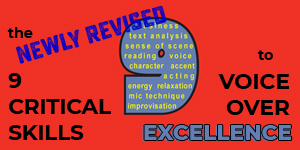|
VOICE ACTING You WILL Be Rejected For Voice Over Jobs - Often. How To Cope With It ... January 16, 2014  By Gary Terzza By Gary TerzzaVoice Talent and Coach (UK) It is going to happen to you sooner rather than later - you will be rejected for a voice over job, or a contract will be cancelled. It is dispiriting and demoralizing, but a fact of every voice actor's life. As this will occur on many occasions, how can you handle the situation so you keep up morale and do not jeopardize future work? This is a road map for you to navigate those knocks and setbacks, based partly on my own experience. I always say you will be rejected for more jobs than you will be accepted for. That is as true in the 'real' world as it is in the wonderful world of voice overs. However in the VO industry it somehow seems more painful - after all, a part of you (your voice) is being turned down and, despite logic telling you otherwise, that can be very hurtful. WHY SO OFTEN? Let me start by examining why rejection happens so often in this business. When agents ask a client what they are looking for, the standard response is, "I'll know it when I hear it" - which is pretty vague, to say the least. What the client really means is, "I have a sound in my head and I am looking for a suitable voice to match it." It is an agent's job to refine the search by narrowing down the options: gender, race, age, accent, tone, etc. Then a small number of voices are presented from the relevant categories. CLIENTS CHANGE THEIR MIND But clients are human and that means prone to making irrational choices. At the back of their minds they may be thinking "young throaty female voice," but when they hear the more mature middle age women on offer, they change their mind. Not only that, your client may be working on behalf of another client; the ad agency may think male is best, but the person who holds the purse strings may prefer a female voice for the project. No matter how good you are in the audition, you may be on to a loser and not even know about it. It is completely out of your hands, but from your perspective you have been given the cold shoulder. And it can hurt, especially when you have your heart set on the job. Rest assured you will be in good company, as international media trainer Constantino De Miguel says in his article on rejection in voice overs, many will have suffered the same fate as you. HOW TO COPE If you think about it logically, only one voice can be chosen. That doesn't necessarily help at times like these, but it is good to know you are not alone. The trick is to keep your spirits up during these low points. So here are a few do's and don'ts to help. 1. Forget About It. I know it seemed important at the time, and yes, it would have been great to get that particular voice job, but there is nothing you can do; you didn't get chosen and it is now completely beyond your control. So (and I know this is easier said than done), banish the project completely from your mind. Just let it go. au revoir and good riddance. 2. Treat Yourself. Although we tend to be hard on ourselves and reward success, not failure, being kind to yourself in times of adversity can be very therapeutic. Your battered ego needs soothing, so do something nice that you like - go for lunch with a friend, make yourself a steaming hot chocolate or go to the movies. Whatever it is, remember you are not rewarding failure, but consoling yourself for having a go, allowing you to move on to another project. 3. Do Another Audition. This can be therapy in itself; dive straight into something completely different. If the job you were rejected for was an audiobook, opt for something else like an upbeat commercial or a wild and wacky character in a video game. Channeling all that disappointment into something distinct and out of your comfort zone focuses the mind, and you never know - you may secure that gig instead. Surprise yourself. 4. Have A Can-Do Attitude. Or to put it another way, take a stoical view. You know you are going to get rejected lots, so just swiftly move on. There are practical steps you can take, such as checking equipment and making sure that your voice is sounding great and that your reading is spot on. Once that is settled in your mind, you can move on with confidence. 5. Don't Contact The Client! Some beginners to the voice over business mistakenly believe that asking for pointers as to why they didn't get the job will help them learn. It won't. The client may have turned you down for all sorts of reasons, many of which will be personal (remember the 'I'll know it when it hear it' adage). How can you possibly learn from 'I can't put my finger on it' or 'I preferred the voice I picked'. Of course, they may be specific and say your delivery was poor or the recording quality was simply not up to the job, but even this may not be that useful. Clients have different quality thresholds, and one person's low quality is another 's 'perfectly acceptable'. It goes without saying that you should strive for the best read and highest quality you can, but other than that it is in the lap of the gods. 6. Don't Blame Yourself. OK, so maybe you did try for a job that was out of your league, but you gave it a damn good go, and bravery in itself is worth a pat on the back. Just doing the script and following the direction is worth a God star. Be proud of yourself and learn from the experience. 7. Don't Blame Others. It is tempting to criticise the director, producer or the pay-to-play (P2P) site on which you found the audition, but you should not. Don't bite the hand that one day may feed you. There are more in-depth coping mechanisms from a psychological point of view that may help you gain a better perspective. FOR YOUR SURVIVAL ... If there is one aspect of rejection I feel is the most important, it is that you are NOT a bad voice over artist. Failing to get the job is not a slap in the face. It is merely part of the industry landscape and goes with the territory of being a voice actor. Understanding this will help you cope you with forthcoming auditions and allow you to take rejection in your stride. Success will taste even sweeter when you secure that gig. --------------------- ABOUT GARY Gary Terzza is a UK voice over coach based in London. He is also a long established voice over artist with a client list that includes Channel 4, BBC, ITV, Pepsi-Cola, Symantec, BAE Systems and Hitachi. Web: www.vomasterclass.com Blog: www.vomasterclass.blogspot.co.uk Twitter: http://twitter.com/VoMasterClass |
|
|
Tell Us What YOU Think!
Please Note: Since we check for spam, there will be a slight delay in the actual posting of your comment.
Comments (2)
Joyce
1/16/2014 at 11:40 AM
Great article. I was told at the beginning that it is not rejection - it is selection. That has kept me auditioning because I realized they are looking for something specific and I may not be it. In fact, I am not usually it. Lots of auditions for one job. I would love to know why but realize it is not going to happen.
BP Smyth
1/16/2014 at 6:45 AM
You are spot on, Gary. The voice-over business is as fickle as it comes. More rejection than acceptance is the norm for sure, and for those that can't take it, it's better to move on to another endeavor to help reduce competition. :-)






.png)


.jpg)
click for new article alerts